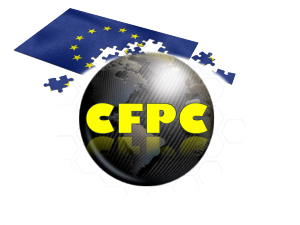OBJECTIVES
Composites are popular as they allow component weight to be reduced without affecting part strength. One of the driving forces is the huge potential market for low cost carbon fibres and high performance composites due to the increasing global demand for lightweight materials across many sectors. In many applications, weight reductions leads to energy savings during the service-life of the product – there is an oft-quoted statistic that every kilogram of weight saved in the manufacture of a plane reduces emissions by 1 tonne of CO₂ per year.
Specific objective of the CFPC Cluster is to build a high-level expert group on to debate on the following topics:
- Optimization of precursor characteristics to further improve carbon fibre performance properties and costs, through the fostering of collaborations between partners from different countries and effective exchange of innovative ideas.
- Implementation of pilot/industrial facilities capable of manufacturing innovative carbon fibres, as well as carbon fibre preforms and semi-finished products.
- Focus on more efficient and sustainable products and processes based on life cycle assessment studies.
- Development of modelling and simulation tools to provide further understanding of properties and phenomena towards the optimisation of innovative composite materials based on carbon-based reinforcements (nano-fillers as carbon-nanotubes or graphene spheres/platelets and/or carbon fibres) as well as carbon fibre preforms and semi-finished products and related manufacturing processes.
- Development of new or improved characterization methods/protocols integrating experimental, numerical and analytical techniques.
- Networking and interaction with other networks to promote multidisciplinarity and cooperation in the production of carbon fibres based materials.
- Current failure models must be improved by multi-scale laminate based analyses incorporating manufacturing defects
- Cost analysis should be expanded to life-cycle cost
- Sustainable composite design will require more advanced design concepts such as design for disassembly, reuse/recycling and life cycle assessment.
- The hi-tech material is wasteful to produce and difficult to recycle.
- SMEs tend to require support on a broad spectrum of issues: product stewardship, managing intellectual property, managing internal capacity constraints and managing different types of risk, connected to different TRLs.
- SMEs often require to adopt a ‘trial and error’ approach to address their research needs not just due to a lack of provision but also because they frequently cannot be certain (especially at early stages of exploration) what type of support / provision they require.
- Financial limitations can affect the search ‘pathway’ since the time this takes can have detrimental impacts on the SME’s financial sustainability.
- Breakthrough testing is more expensive, while incremental (more mainstream) demand can be easier to satisfy
FOCUS
The focus is on carbon fibres & advanced high performance composites to support upscaling and industrial exploitation, together with impact of the European economy.
In this context, the following themes are considered:
- Fibres
- Matrix & Modification
- Hybrid materials
- Smart structures
- Textiles & Preforming
- Surface & Interface – Functionalization
- Manufacturing/Processing
- Market, Application, SMEs, Industry
- Pilot & Upscaling
- Green & Low Cost (LCA, LCC)
A wide range of application fields including lightweight materials including composites, hybrid and functionally graded materials, composites for energy technologies (storage, conversion) and climate changes, will be discussed together with materials end-users.
By elaborating on these themes the CFPC will support horizontal actions towards:
- European Policy & Strategy
- Characterization, Modelling & Design
- Safety & Standards
- Dissemination and Networking

